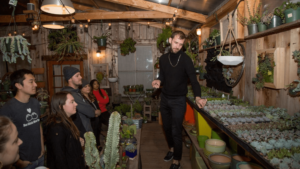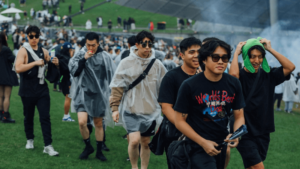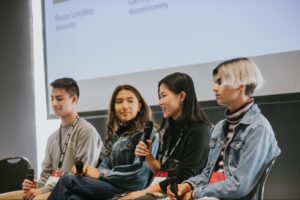This is the first interview feature in our Female Leaders of the Event Industry content series – a celebration of empowerment and diversity in our industry, and a chance to shine the spotlight on those leading the way.
Aged only 35, Jemma Peers has enjoyed a stellar rise to the top of the events industry. She is Commercial Director of Stourbridge and London-based events agency Top Banana and sits on the board as part of the leadership team.
Being interviewed as part of Eventbrite’s ‘Female Leaders of the Events Industry’ series, Jemma explains how she has pushed forward to climb the ranks since getting her big break at 18.
- Can you briefly tell us about your career path and how you got to the role you are in today?
I’ve always wanted to be in the industry since I was quite young. I had a careers advisor who told me it would never happen; it’s far too niche, dream on, it’s not something for you. I was a bit despondent and thought, “What do I do next?” I decided to have a year out and during that year I saw an event assistant job advertised at Corporate Innovations, an event agency in Oxfordshire. I got offered the role and within six months was made an event manager at the request of the client I was working on. I was only 18; I was quite astonished!
I spent the next eight years working my way up through the ranks to the account management spectrum, managing large accounts. Then I went into team management, managing a team of event managers, and from there became head of a department, owning the whole delivery side of the agency. I got myself on the board and after a couple of years, I was looking for a new challenge with a different agency so moved over to Top Banana.
- How did the negativity you received at the start of your career affect you?
I’m the kind of person that when faced with adversity I’ll do my best to turn it around and succeed from it. The basis of the career advisor’s argument was that it’s a small market and from where I’m from in the country, unless I was willing to uproot myself and move to London, it wouldn’t happen. It just made me think, “Why should that be a constraint if this is what I want to do?”.
- Have you always been ambitious?
I’ve always been strong and focused on the goals I’ve set myself. And I’ve made a point of being honest and open with my line managers about my aspirations as I’ve gone through my career.
At my last agency, I made it clear to the owner of the business that I had a two-year goal to be on the board and asked him what he felt I needed to do, change, develop or grow in order to do that. I took feedback from everyone possible, I got myself a business coach and went on a leadership course to support that.
- Why was joining the board important to you?
I want to leave an event legacy when I go – hopefully in about 30 years’ time. I think being on the board of an agency will enable me to do that. I want to feel like I’ve changed our industry in some way. That desire has grown over the last few years as I’ve climbed the ladder.
One thing I massively want to change is the inclusion piece. I’d like to focus on inclusion and diversity as I think we still have a long way to go in the industry.
- Have you taken steps towards improving inclusion in the industry already?
Absolutely. At Top Banana we’re 70% female; although that certainly doesn’t mean we exclude males – the rise of women doesn’t mean the fall of men. And it’s not just about the female/male split; I’m a real advocate of nurturing young talent.
I was very young when I started in the industry and I grew very fast through the ranks, so I like to be able to support that as well. I like to work with the young people I meet and help them with their event management university courses.
Despite being located in the West Midlands, Top Banana manages to be an inclusive company. There are lots of us who are full time working mums, we’re very flexible around that, and we’ve got a whole span of ages, colours and religions. We really promote inclusion with our clients too. When we’re building content and ideas we make sure we look inclusively at the audiences we’re engaging with.
- Have you had to make any sacrifices to get to where you are today?
I always wanted to have a family but I wasn’t going to give up on my career aspirations, I was clear on that. The only sacrifice I had to make was going back to work incredibly quickly after having my son, but that wasn’t down to any pressure; that was my own doing. I want to keep my finger in and I didn’t want to step away for too long.
I balance being a mother and having a career very well and I feel very proud I’m able to show my son things that other children don’t necessarily get to see because of my job. And because of my experience, I can talk to him in an educated way about other places around the world and help expand his horizons.
Also, I’m showing him that it’s OK for mums to work. I want to show him that his wife, should he choose to take one when he grows up, can work; they can have career goals and aspirations as well as a family. I think it’s really important that I instil that in him.
- What do you love most about your role?
I think, like everyone in this industry, it’s the variety. Every day is different and I love that. I love seeing the young talent we have grow. I love keeping in touch with the people who used to be on my team and seeing how well they’re doing.
I love seeing how events give people a platform to create something unique. I love that the memories we create through our events will stay with people forever. People who’ve been involved with some of my projects still keep in touch and say, “I can’t believe we did that together.”
- What has been your biggest work-related achievement?
I was named in C&IT Magazine’s A-List when I was only 26. At the time, that was pretty exceptional for me. That was 10 years ago. I see guys in my team getting it now and I feel really ancient!
Overall though, I’m just proud of having made gradual steps through the ranks. I like that I’ve done all roles at all levels in order to get me to where I am now.
- What motivates you?
There is an inner joy that working in this industry brings me; it’s who I am. My hobby is my job. I love the events industry and that’s really what drives me. It’s being able to do amazing things, test boundaries, to be creative and help others be creative.
- What three top skills do you believe you bring to your role and your team?
An authenticity; when I’ve managed teams I’ve always been really honest with them and taken them on the journey with me.
A holistic view; I am able to see the bigger picture that perhaps they can’t, which is an important skill in a leader.
I’m a really good motivator; I can make people feel good, strong and confident when they’re perhaps feeling vulnerable about a project or about their own skills. I think I’m good at bringing them through those periods.
- Do you think the events industry provides good opportunities for ambitious women?
It’s definitely changed. When I started, the young girls were the event managers and senior managers were the men. I think the tide is turning. I’ve seen stronger female characters coming through, and while there’s still the generation of male leaders, I think they’re becoming more open to the ambitious female and to giving them opportunities.
With the likes of Fay Sharpe running the Fast Forward 15 mentoring scheme for women, it’s really shining a light on it. That’s a definite change; that kind of programme wouldn’t have existed when I started 18 years ago.
- What advice would you give to women looking for progression in the events industry?
Set yourself small tangible goals throughout your career. In the next year, three years and five years, think about where you want to be and what success looks like at each of these points. Then you can start to gauge a gradual development and identify where you need to learn or make improvements.
I’d also recommend getting a mentor, whether that’s someone officially, like a business coach or someone unofficially, someone you’ve got who you can bounce ideas off, talk about how you can develop in certain areas. That doesn’t necessarily have to be your line manager; look outside the box at who you’re going to get some good coaching conversations with.
Do you think the events industry needs greater inclusion? Join the discussion about gender and age equality on the EventTribe forum.





